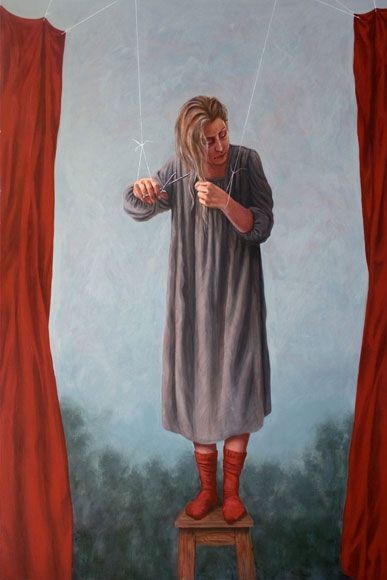Tehran,
No. 26, Golestan Blv., Africa St., Tehran
17 September 2010 - 28 September 2010
"Standing opposite next to the curtain, with his back to the leafless garden."
In his paintings Saeed Rafiee renders an interpretation of human form based on the people surrounding him, as he recreates them in his own abstract world. A woman cutting her hair, an old man smoking a cigarette behind his prized championship photograph, a child playing with her dolls and women covering their faces from us. These are all daily routines, conveyed through a bizarre puppet show of suspended strings created by the artist in a universe void of earth.
The purgatorial climate of these paintings demonstrate the artist’s fear of death, loneliness, being controlled, old age and even the ultimate phobia of being visible. His works trigger both social connotations and extremely private and internal implications.
By removing the barrier, which exists between the outdoor environment, and objects and elements reflective of the indoor setting, the artist creates his own eternity.
He puts the ageless question of Will and Determinism to the despondent characters being blatantly controlled by strings from above, who are too complacent vis-a-vis the tedium and monotonous routine of their daily lives to make an effort to set themselves free. Where are these strings suspended from? Where is this familiar and yet curious space? It is the hidden enigmas inside these incongruous compositions created by the artist, that make his works so delightfully appealing.
In Rafiee’s paintings, all elements are arranged in the most alluring forms anticipating a moment of ultimate crisis, which is what sets his work apart from that of similar Romantic artists. It could be assumed that the value of these paintings lies mainly in the fundamental questions they pose, using ostensibly ordinary elements with new and varying arrangements. Questions, as old as the history of mankind.
The presentation of beauty in these works is in such manner, that it enables us to reach the ultimate moment of resurrection as witnessed in another composed scene, that of Jesus seated at the table, in The Last Supper story, peaceful yet resonant.
Dr. Behnam Kamrani
In his paintings Saeed Rafiee renders an interpretation of human form based on the people surrounding him, as he recreates them in his own abstract world. A woman cutting her hair, an old man smoking a cigarette behind his prized championship photograph, a child playing with her dolls and women covering their faces from us. These are all daily routines, conveyed through a bizarre puppet show of suspended strings created by the artist in a universe void of earth.
The purgatorial climate of these paintings demonstrate the artist’s fear of death, loneliness, being controlled, old age and even the ultimate phobia of being visible. His works trigger both social connotations and extremely private and internal implications.
By removing the barrier, which exists between the outdoor environment, and objects and elements reflective of the indoor setting, the artist creates his own eternity.
He puts the ageless question of Will and Determinism to the despondent characters being blatantly controlled by strings from above, who are too complacent vis-a-vis the tedium and monotonous routine of their daily lives to make an effort to set themselves free. Where are these strings suspended from? Where is this familiar and yet curious space? It is the hidden enigmas inside these incongruous compositions created by the artist, that make his works so delightfully appealing.
In Rafiee’s paintings, all elements are arranged in the most alluring forms anticipating a moment of ultimate crisis, which is what sets his work apart from that of similar Romantic artists. It could be assumed that the value of these paintings lies mainly in the fundamental questions they pose, using ostensibly ordinary elements with new and varying arrangements. Questions, as old as the history of mankind.
The presentation of beauty in these works is in such manner, that it enables us to reach the ultimate moment of resurrection as witnessed in another composed scene, that of Jesus seated at the table, in The Last Supper story, peaceful yet resonant.
Dr. Behnam Kamrani
